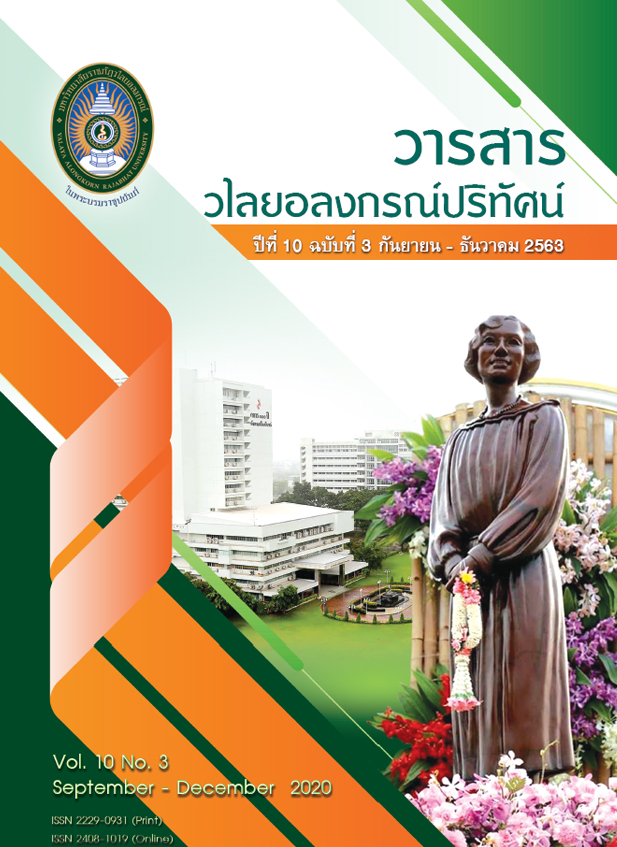สิทธิประโยชน์ทางภาษีในการบริจาคเงินและทรัพย์สินให้แก่องค์กรปกครองส่วนท้องถิ่น
คำสำคัญ:
ภาษีบ้านเกิด, การระดมทุนสาธารณะ, การบริจาคเพื่อสาธารณกุศล, สิทธิประโยชน์ทางภาษีบทคัดย่อ
รายได้ขององค์กรปกครองส่วนท้องถิ่นที่จัดเก็บเองและเป็นรายได้ที่แสดงฐานะทางการคลังของท้องถิ่น คือ ภาษีท้องถิ่น ส่วนใหญ่จะมาจากการจัดเก็บภาษีจากฐานทรัพย์สินหรือความมั่งคั่ง (Wealth Tax) ที่รัฐบาลมอบอำนาจในการบังคับจัดเก็บให้แก่องค์กรปกครองส่วนท้องถิ่น ทำให้องค์กรปกครองส่วนท้องถิ่นมีอิสระในการจัดเก็บภาษีประเภทนี้ได้ด้วยตนเองและรายได้จากภาษีท้องถิ่นทั้งหมดเป็นขององค์กรปกครองส่วนท้องถิ่น โดยไม่ต้องนำเข้าบัญชีเงินคงคลังของรัฐบาล กฎหมายที่ให้อำนาจองค์กรปกครองส่วนท้องถิ่นจัดเก็บภาษีท้องถิ่นที่สำคัญในปัจจุบัน คือพระราชบัญญัติภาษีที่ดินและสิ่งปลูกสร้าง พ.ศ. 2562 มีผลบังคับใช้เมื่อวันที่ 1 มกราคม พ.ศ. 2563 แต่เนื่องจากเนื่องจากกฎหมายลำดับรองที่อยู่ในความรับผิดชอบของกระทรวงการคลังและกระทรวงมหาดไทยยังดำเนินการไม่แล้วเสร็จ รัฐมนตรีว่าการกระทรวงมหาดไทยจึงเห็นชอบให้ขยายระยะเวลาจัดเก็บภาษีที่ดินและสิ่งปลูกสร้าง ออกไปจนถึงวันที่ 31 สิงหาคม พ.ศ. 2563
นอกจากนี้ เมื่อวันที่ 10 มิถุนายน พ.ศ. 2563 รัฐบาลได้ประกาศใช้พระราชกฤษฎีกาลดภาษีสำหรับที่ดินและสิ่งปลูกสร้างบางประเภท พ.ศ. 2563 โดยเหตุผลในการประกาศใช้พระราชกฤษฎีกาฉบับดังกล่าว คือ เนื่องจากโรคติดเชื้อไวรัสโคโรนา 2019 (Covid-19) ได้ระบาดอย่างรุนแรงทั่วโลกรวมทั้งประเทศไทย ทำให้ระบบเศรษฐกิจทั่วโลกและของประเทศไทยหดตัวลงอย่างรุนแรงและรวดเร็ว กระทบต่อประชาชนทุกสาขาอาชีพในวงกว้าง สมควรลดภาษีสำหรับที่ดินและสิ่งปลูกสร้างที่จะจัดเก็บตามกฎหมายว่าด้วยภาษีที่ดินและสิ่งปลูกสร้าง เพื่อให้เหมาะสมกับสภาพความจำเป็นทางเศรษฐกิจ เพื่อบรรเทาผลกระทบต่อประชาชนโดยรวม ซึ่งการประกาศใช้พระราชกฤษฎีกาฉบับดังกล่าว มีผลทำให้องค์กรปกครองส่วนท้องถิ่นสูญเสียรายได้ประมาณสามหมื่นเก้าพันล้านบาท
จากการศึกษาพบว่าในปัจจุบันภาษีท้องถิ่นที่องค์กรปกครองส่วนท้องถิ่นจัดเก็บเอง มีสัดส่วนรายได้ที่น้อยมาก เมื่อเทียบกับรายได้รวมขององค์กรปกครองส่วนท้องถิ่น กล่าวคือ รายได้ขององค์กรปกครองส่วนท้องถิ่นเกือบร้อยละ 90 มาจากงบประมาณที่รัฐบาลจัดเก็บและแบ่งให้ ตลอดจนมาจากเงินอุดหนุน ผ่านกรมส่งเสริมการปกครองท้องถิ่น กระทรวงมหาดไทย ซึ่งแม้ว่าปัจจุบันรัฐธรรมนูญได้กำหนดให้องค์กรปกครองส่วนท้องถิ่นจัดเก็บรายได้เองแล้วก็ตาม แต่กฎหมายที่ใช้บังคับในการจัดเก็บภาษีท้องถิ่นขององค์กรปกครองส่วนท้องถิ่นในปัจจุบัน ยังไม่สามารถอำนวยรายได้ให้แก่องค์กรปกครองส่วนท้องถิ่นได้อย่างเพียงพอ
ประเทศญี่ปุ่นนับเป็นตัวอย่างที่ดี ในการให้ความสำคัญกับอิสระทางการคลังของท้องถิ่น เนื่องจากองค์กรปกครองส่วนท้องถิ่นของประเทศญี่ปุ่นมีความสามารถในการจัดทำภารกิจที่สำคัญเป็นจำนวนมาก สาเหตุที่องค์กรปกครองส่วนท้องถิ่นประเทศญี่ปุ่นมีความอิสระทางการคลังค่อนข้างสูง เป็นผลมาจากบทบัญญัติแห่งรัฐธรรมนูญญี่ปุ่น ฉบับ ค.ศ. 1947 ในส่วนที่ว่าด้วยองค์กรปกครองส่วนท้องถิ่นประเทศญี่ปุ่น ได้ให้หลักประกันว่า “การบริหารงานท้องถิ่นของประเทศญี่ปุ่นจะต้องเป็นไปตามหลักประกันความอิสระของท้องถิ่น และมีอิสระในการบริหารงานและจัดการทรัพย์สินของตนเอง” นอกจากนี้ การที่องค์กรปกครองส่วนท้องถิ่นของประเทศญี่ปุ่น สามารถให้บริการสาธารณะที่หลากหลายและมีประสิทธิภาพได้เช่นนี้ เนื่องจากองค์กรปกครองส่วนท้องถิ่นของประเทศญี่ปุ่นมี แหล่งรายได้มาจาก 6 แหล่ง ได้แก่ ภาษีท้องถิ่น (Local Tax) ภาษีที่รัฐจัดเก็บและแบ่งให้แก่ท้องถิ่น (Local Allocation Taxes) ภาษีที่รัฐจัดเก็บและโอนมอบให้ท้องถิ่น (Local Transfer Taxes) เงินอุดหนุนที่รัฐบาลจ่ายให้ (National Government Disbursement) พันธบัตรเงินกู้ท้องถิ่น (Local Public Bonds) และรายได้อื่นๆ
ประกอบกับเมื่อปี พ.ศ. 2551 รัฐบาลญี่ปุ่นได้มีการออกกฎหมายอนุญาตให้ประชาชนที่บริจาคเงินให้แก่องค์กรปกครองส่วนท้องถิ่นจะได้รับสิทธิประโยชน์ 2 ประการ คือ สามารถนำเงินบริจาคมาหักลดหย่อนภาษีเงินได้และภาษีที่อยู่อาศัยได้ และได้รับของตอบแทนเป็นผลิตภัณฑ์จากท้องถิ่นต่าง ๆ ทั่วประเทศญี่ปุ่น ซึ่งนอกจากประเทศญี่ปุ่นแล้ว ประเทศสหรัฐอเมริกาก็มีมีกฎหมายที่อนุญาตให้ประชาชนหรือบริษัทเอกชนที่บริจาคให้แก่องค์กรหรือหน่วยงานของรัฐ สามารถนำเงินบริจาคมาหักลดหย่อนภาษีได้ ผู้เขียนเห็นว่า หากมีการนำนโยบายภาษีบ้านเกิด (Hometown Tax) หรือการระดมทุนสาธารณะ (Crowd Funding) มาใช้ในประเทศไทย น่าที่จะช่วยเพิ่มรายได้ให้แก่องค์กรปกครองส่วนท้องถิ่นได้ และช่วยกระจายรายได้ให้แก่ชุมชนได้อีกทางหนึ่งด้วย
เอกสารอ้างอิง
กรมส่งเสริมการปกครองส่วนท้องถิ่น. (2561). ข้อมูลรายได้ขององค์กรปกครองส่วนท้องถิ่น ประจำปีงบประมาณ พ.ศ. 2561. กรุงเทพฯ: กรมส่งเสริมการปกครองส่วนท้องถิ่น กระทรวงมหาดไทย.
งามสิรี ภู่เจริญ. (2562). ภาษีที่ดินและสิ่งปลูกสร้างกับยุทธศาสตร์ชาติ. วิทยานิพนธ์มหาบัณฑิต สาขาวิชากฎหมายภาษี มหาวิทยาลัยธรรมศาสตร์.
ประชาชาติธุรกิจ. (2560). “แห่ตั้งบริษัทโยกทรัพย์สิน เจ้าสัวสบช่องหลบภาษี”. ประชาชาติธุรกิจ ฉบับที่ 4946 วันจันทร์-พุธ ที่ 7 มิถุนายน 2560, หน้า 1. (2563, 2 มิถุนายน)
ประชาชาติธุรกิจออนไลน์. (2562). บี้ภาษีที่ดิน 32 ล้านโฉนด ตะลึงพลิกที่หมื่นล้านปลูกมะนาว. ประชาชาติธุรกิจออนไลน์. [ออนไลน์], เข้าถึงได้จาก: https://www.prachachat.net/property/news-401676 (2563, 2 มิถุนายน)
ประชาชาติธุรกิจออนไลน์. (2563). ลดภาษีที่ดินกระหน่ำ 90% ทุกหมวด สูญรายได้ 3.9 หมื่นล้าน. ประชาชาติธุรกิจออนไลน์. [ออนไลน์], เข้าถึงได้จาก: https://www.prachachat.net/property/news-472538 (2563, 2 มิถุนายน)
พระราชกฤษฎีกาลดภาษีสำหรับที่ดินและสิ่งปลูกสร้างบางประเภท พ.ศ. 2563
หนังสือด่วนที่สุด มท 0808.37 ว 7475 ลงวันที่ 11 ธันวาคม 2562 เรื่อง การขยายกำหนดเวลาดำเนินการตามพระราชบัญญัติภาษีที่ดินและสิ่งปลูกสร้าง พ.ศ. 2562
Bkkcitismart. (2562). คอนโดปล่อยเช่าเฮ คลัง-มหาดไทย เตรียมประกาศ จ่ายอัตราที่อยู่อาศัย. [Online], Available: https://www.bkkcitismart.com/ข่าว/26-dec-2019/ (2020, 27 December)
Economist. (2015). Japan’s Rural Regions: Hometown Dues, ECONOMIST. [Online], Available: http://www.economist.com/news/asia/21648703-struggling-parts-countryside-have-found-novel-way-attract-money-hometown-dues (2020, 20 April)
Furusato-tax.jp. (2020). Donation to Municipality Produce by Furusato Choice. [Online], Available: https://www.furusato-tax.jp/donationtojapan/en/ (2020, 8 February)
Furusato-tax.jp. (2020). Search for thank-you items find local government find the Ranking Feature/ Campaign, [Online], Available: https://www.furusato-tax.jp/about?header_guide (2020, 6 January)
Furusato-tax.jp. (2020) Select payment method, [Online], Available: https://www.furusato-tax.jp/tax/form/28205 (2020, 10 January)
Japantimes. (2020) In Japan, the perfect tax-deductible gifts: face masks and sanitizers, [Online], Available: https://www.japantimes.co.jp/news/2020/04/22/national/face-masks-sanitizers-hometown-tax-gifts- coronavirus/#.XsS5C0QzaUl (2020, 2 August)
Janet, W. K. (2017). “Lobsters, Hot air balloons, and the hometown tax: A Japanese model for revitalizing rural economies in the United States. Columbia Business Law Review. 2019(3): 1102-1104, 1127.
Japan External Trade Organization (JETRO). (2020). Overview of individual tax system. [Online], Available: https://www.jetro.go.jp/en/invest/setting_up/section3/page7.html 2020, 5 February)
Kyodo. (2017). “Donations under hometown tax payment program hit record ¥284 billion in 2016”, [Online], Available: https://www.japantimes.co.jp/news/2017/07/04/business/donations-hometown-tax-payment-program-hit-record-%C2%A5284-billion-2016/#.Xp_Emv0zaUk (2020, 5 March)
Niitsu, N. (2016). “Innovative 'Hometown Tax' Donation Program Supports Municipalities”, [Online], Available: https://www.japanfs.org/en/news/archives/news_id035641.html (2020, 6 March)
Nikkei. (2016). New customers for hometown tax payment and special products, [Online], Available: http://www.nikkei.com/article/DGXLASDJ01H1L_Q6A211C1MM0000/ (2020, 15 January)
soumu.go.jp. (2019). I understand Oldness and tax payment, Ministry for Internal Affairs and Communications, [Online], Available: https://www.soumu.go.jp/main_sosiki/jichi_zeisei/czaisei/czaisei_seido/furusato/about (2020, 9 March)
soumu.go.jp. (2019). About tax deduction, Ministry for Internal Affairs and Communications, [Online], Available: https://www.soumu.go.jp/main_sosiki/jichi_zeisei/czaisei/czaisei_seido/furusato/mechanism/deduction.html (2020, 4 March)
Yasuda, T. (2016) Koka-dai daga jakuniku kyoushoku [The Hometown Tax Is Effective, but Cutthroat], MAINICHI SHIMBUN, [Online], Available: http://mainichi.jp/articles/20160907/ddm/004/070/002000c (2020, 4 March)
Nohara, Y. (2017). “Rural 'furusato nozei' beer, beef thank-yous costing urban Japan much-needed revenues”, JAPAN TIMES, [Online], Available: https://www.japantimes.co.jp/news/2017/01/13/national/rural-furusato-nozei-beer-beef-thank-yous-costing-urban-japan-much-needed-revenues/#.XsneBUQzaUk (2520, 5 February).
ดาวน์โหลด
เผยแพร่แล้ว
รูปแบบการอ้างอิง
ฉบับ
ประเภทบทความ
สัญญาอนุญาต
ข้อความที่ปรากฏในบทความแต่ละเรื่องในวารสารวไลยอลงกรณ์ปริทัศน์ เป็นความคิดเห็นของผู้นิพนธ์แต่ละท่าน มิใช่เป็นทัศนะและมิใช่ความรับผิดชอบของกองบรรณาธิการจัดทำวารสาร และ
มหาวิทยาลัยราชภัฏวไลยอลงกรณ์ ในพระบรมราชูปถัมภ์


